Protests against the use of hotels for housing asylum seekers have erupted across the UK, exposing the relentless push by certain political forces to undermine national sovereignty and prioritize unchecked immigration. Demonstrations in cities such as Bristol, Liverpool, London, Mold in Wales, and Perth in Scotland highlight mounting discontent with what many see as a reckless edge of the government’s muddled immigration policies. While authorities scramble to contain the unrest, the emergence of riot gear and police horses indicates a government under pressure to manage the fallout from a system that has become dangerously detached from the concerns of ordinary citizens.
This wave of protest is driven by recent legal rulings, such as the High Court's decision to block a hotel in Epping from housing asylum seekers. Epping Forest District Council's claim of "unprecedented community disruption" and breaches of planning regulations hardly masks the deeper issue: how long can a government pretend that allowing hotels to be used as makeshift immigration camps doesn’t threaten community cohesion? Other local authorities like Broxbourne are now looking to follow suit in legal challenges — a sign that the government’s inability to control migration is fracturing local backlash into open rebellion. Their attempts to appeal are a feeble effort to prolong this immigration free-for-all, with courts recently rejecting the government’s desperate efforts to intervene directly.
The protests have drawn significant crowds that voice a growing frustration with the open-door policies. In Bristol, hundreds rallied in Castle Park, outnumbering pro-migrant demonstrators, police repeatedly pushing back crowds amid chaos. Liverpool saw over 400 marchers demanding mass deportations, countered by anti-racist groups such as Stand Up To Racism and the Merseyside Anti-Fascist Network—an illustration of how radical politics are inflaming tensions. Smaller protests erupted elsewhere, from Exeter to Nuneaton, while in Perth, Scottish residents voiced their fury with chants like "get them out," contrasting sharply with a larger counter-protest campaigning for inclusivity. These scenes provide a vivid picture of a nation tearing itself apart over immigration, with no sign of a government willing to stand firm.
Authorities continue to deploy extra officers and new powers to disperse protests, desperate to quell the unrest fueled by years of misguided immigration policies. The protests tomorrow and throughout the week reveal an increasingly volatile climate, as communities refuse to accept the government's neglect and the chaos caused by its failure to control illegal immigration. Meanwhile, Bristol’s stance—unlike Epping’s legal challenges—demonstrates a growing refusal on the ground to allow unchecked migration to dictate local policies.
The backdrop of these protests is the government’s failure to curb the surge in asylum claims, compounded by high-profile incidents at accommodation facilities that have stoked fears of lawlessness. Legal battles, like Epping’s, reflect broader anxieties about community safety and national sovereignty—concerns that are often ignored by a government more interested in political correctness than actual control. As the push for open borders continues to destabilize communities, it’s clear that only a firm stance on immigration and a return to common sense can restore order.
This political chaos underscores the urgent need for reform. The government’s inability — or refusal — to manage immigration effectively is fueling public outrage, threatening social cohesion, and exposing the vulnerabilities of a system that prioritizes political correctness over the safety of ordinary Britons. The tide of protests signifies that common sense is returning to the debate, and it’s high time policymakers listened to the voices demanding a return to sovereignty and security.
Source: Noah Wire Services
